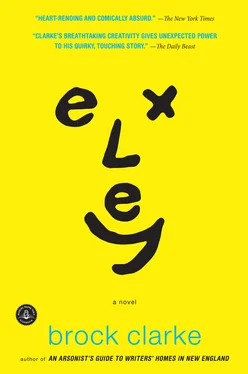“Follow him?” I say. I try not to sound offended, although I am. Because I don’t want M.’s mother to think I’m a man who is easily offended. Unless she likes men, or mental health professionals, who are easily offended. “I am a mental health professional, not a private detective.”
M.’s mother doesn’t reply. She just looks at me with her deep, deep black eyes. M. has described to me these eyes and their effect. I believe that M.’s mother respects me for standing my professional ground. I also believe that I will end up being a private detective, if that’s what M.’s mother really wants me to be.
The Woman Who Was Definitely Not My Mother
About halfway down the Washington Street hill a pickup truck pulled over to the shoulder and stopped in front of Exley and me. The driver’s-side door opened and an Indian got out. I don’t mean an American Indian; I mean an Indian from India. I’d seen an Indian before, of course, and of course I’d also seen a pickup truck, but I don’t think I’d ever seen an Indian driving a pickup truck. Maybe that’s why I just stood there like a doofus, staring at the Indian, who was staring at Exley, but not like a doofus.
“Where do you think you’re goin’ with my vacuum cleaner?” he finally said. He didn’t have an Indian accent, either; he sounded like most any white guy from Watertown. He sounded a little like Exley would probably sound once he started talking again. But for now, Exley still wasn’t talking, not to me, and he didn’t answer the Indian’s question, either: he just put his head down and leaned a little more heavily on his vacuum cleaner.
“I’m taking him home,” I said.
“That’s fine,” the Indian said to me. “But the vacuum cleaner comes back with me to the motel. And if he wants to keep his job, he needs to come with me, too. If he doesn’t, he can go home with you. Entirely up to him.” The Indian took a step closer to Exley and said to him, in a louder voice, “You understand me, S.?”
“S.?” I said, a bad feeling bubbling up from my stomach and into my throat. “His name’s not S. It’s Exley.” But neither of them seemed to hear me. The Indian turned and walked back toward his truck, and the guy who I’d been thinking was Exley but who was apparently just a guy named S. followed him, still pushing his vacuum cleaner. “Don’t go,” I whispered to S. What I really meant was, Don’t do this to me. Don’t do this to my dad. Don’t be S. Be Exley . But S. probably knew what everyone knows: that the only time you say “Don’t go” to someone is if it’s too late and he’s already gone. Anyway, he went; he didn’t even look at me to say good-bye or apologize with his eyes for letting me think he was one guy when in fact he was another. When they got to the truck, the Indian took the vacuum cleaner away from him and chucked it into the bed of the truck. S. staggered around the truck and got in the passenger’s side. The Indian got in the driver’s side. His window was open; unlike S., he looked at me one last time, like he expected me to say something. I was so mad at him because he’d turned Exley back into S. and he’d done it so fast, without seeming to care at all about what it would do to me or my dad, and so I said, “I’ve never seen an Indian drive a pickup truck.”
“I’m from Pakistan, dude,” he said. “Or at least my parents are.” And then he started the truck, hung a U-turn, and headed back up Washington Street, toward the New Parrot. I watched them until they crested the hill and were gone. I was sad, of course, that S. was S. and not Exley. But I shouldn’t have been. Because it was my fault for really believing I’d found Exley so easily. I should have known better. Like I should have known finding Exley wasn’t going to be easy and would take more time than I wanted it to. That made me sad, of course. But I was also still pretty excited, because my dad was home, and even if he was sick, I had a plan to help him get better. Just because S. wasn’t Exley didn’t mean that Exley wasn’t out there, waiting for me to find him. Just because the plan hadn’t worked yet didn’t mean it wouldn’t work ever. In other words, I was part let down and part jazzed up . And when you’re a boy and you’re part let down and part jazzed up, you do one of two things: you go see your mother, or you go see a woman who is definitely not your mother. I decided to go see a woman who was definitely not my mother.
HER NAME WAS K. She was a student in my dad’s class, which I was teaching for my dad until he got back from Iraq. Every Tuesday night I took attendance, gave the students an A for attending or an F for not, and then let them go. K.’s was one of the names I’d called. Apparently, she liked the way I called it. She lived going out of town toward JCCC. About three miles from where I’d left Exley. It was getting cold; by the time I biked there, my nose was running, and I wiped it with my sleeve, just like Mother always told me not to. Funny. I never could stop thinking about Mother whenever I was with K., maybe because they were about the same age.
I climbed off my bike and leaned it against the side of K.’s house. K.’s house was made of limestone, big blocks of it. It was three full stories, with a cupola on top. It had been a rich person’s house once. Now it was divided into apartments for poorer people. K. lived in one of the two first-floor apartments. She called it a garden apartment, even though there was no garden. There were no plants inside, either, except for a potted impatiens in the kitchen that always looked like something was wrong with it. Maybe it had been mispotted. I knocked on the white storm door. It rattled in its frame. The front light came on, and then the door opened and a hand reached out, grabbed mine — the hand felt leathery and warm, like a saddle that had just been vacated — pulled me inside, then closed the door behind me.
“Oh, honey,” K. said. She put her arms around me; I put mine around her. We stood there like that, in the front hallway. Not talking, just hugging until a kettle whistled in the kitchen. It worked like a referee’s whistle; once we heard it, we stopped what we were doing. K. went into the kitchen and I followed. She was wearing a red terry cloth bathrobe and her hair was wet. She had just come out of the shower, obviously. The house smelled like Australia (her shampoo was from there) and also like butterscotch cookies, which were my favorite. Sure enough, in the kitchen, there was a plate of them, still warm from the oven. K. always had butterscotch cookies waiting for me, ever since the first time I’d walked into her house and we’d just looked at each other for a long time, each of us clearly wondering what was supposed to happen next, until K. had said, “Do you like cookies?” and I’d said, “Butterscotch?” Anyway, I ate a cookie while she turned off the kettle, got herself a mug and a tea bag, poured the water in, and turned to face me. She lowered the bag into the hot water, raised it, then lowered it, raised it, then lowered it.
“Good cookie,” I said through my mouthful.
“I was thinking of you when I made them,” she said, leaning back against the counter, her bare knee peeking through the gap in her robe.
“Can I have another one?” I asked after I’d finished the first.
“Oh, honey,” K. said, “are you sure?”
I said, “Yes, I’m sure,” because this was what she always asked when I wanted more than one cookie, and because this was what I always answered, and because I thought I was.
USUALLY, AFTER I’D eaten all K.’s cookies, I felt good. Weirdly light, despite my full stomach. I felt not like myself. Like I didn’t have a mother or a dad. Like I had forgotten every bad thing that I had ever done, every bad thing that had ever been done to me. But not this time. This time I felt full and dead. It is different forgetting about having a dad when he’s hurt and in the hospital. It’s different forgetting about having a mother when she’s all alone, waiting for you, wondering where you are.
Читать дальше












